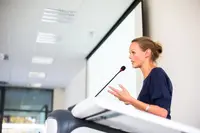
Master of Personal and Professional Communication
Master in Personal and Professional Communication: Access all the courses in this comprehensive program and become the expert you aspire to be
4.6 400 Hours of study 576 classes 575 exams

Master in Personal and Professional Communication: Access all the courses in this comprehensive program and become the expert you aspire to be
4.6 400 Hours of study 576 classes 575 exams

This training course provides strategic competencies for effective intervention in couple dynamics. Through the mastery of advanced models of active listening, empathy and assertive communication, the capacity for mediation and const
4.6 48 Hours of study 69 classes 69 exams

This body language course will teach you to read what is not said. You will learn to analyze gestures, postures and expressions to improve your empathy and lie detection
4.6 32 Hours of study 48 classes 48 exams

Advanced Communication: Beyond Disagreement: Master the art of empathetic communication. Learn to transform disagreements into opportunities for connection and create constructive solutions for everyone.
4.6 48 Hours of study 80 classes 80 exams

This Power Your Voice course will provide you with the necessary tools to project confidence, authority and influence in all your environments: personal, academic and professional
4.6 40 Hours of study 51 classes 51 exams

This communication skills course integrates the fundamental pillars of the Master's in Communication, enabling you to master public speaking and assertiveness to stand out in any environment.
4.6 64 Hours of study 85 classes 85 exams

Essential Communication: Foundations for Connection: Master the art of clear communication. Learn to achieve mutual understanding and to build solid foundations for everyone
4.6 40 Hours of study 68 classes 68 exams

This Public Speaking course will provide you with the essential techniques to transform the way you communicate, gaining the clarity and confidence needed to lead, persuade and build trust
4.6 136 Hours of study 190 classes 189 exams

Acquire advanced communication techniques not only to navigate your daily disagreements, but to connect with the real needs of others and guide the conversation toward truly constructive solutions.
4.6 56 Hours of study 70 classes 70 exams
I am very satisfied with the structure of the master's. The communication techniques are clear and can be applied from day one.
Elena Herrero
Master's in Communication
It explains the key concepts of public speaking and assertive communication in a very easy-to-understand way.
Marcos Torres
Courses in Public Speaking and Communication
The Master's in Communication has been a great discovery. I fully recommend it.
Antonio T.
Courses in Social Skills
Knowing how to communicate is fundamental because the quality of our relationships depends on it. Developing this skill improves understanding, strengthens trust, and prevents small misunderstandings from becoming big problems.
It allows you to transform everyday interactions into opportunities for growth, fostering more collaborative and productive environments in both personal and professional spheres.
Assertive communication is the ability to express your needs and opinions clearly and respectfully, without being passive or aggressive. It is a key tool for building healthy relationships because it allows you to defend your point of view without damaging the bond.
Practicing it reduces the other person's defensiveness, facilitates mutual understanding, and promotes the search for fair solutions for both parties, creating a more honest and effective dialogue.
Hearing is a physiological act of perceiving sounds. In contrast, active listening is a conscious process that involves paying full attention, interpreting the verbal and non-verbal message, and demonstrating that it has been understood.
While hearing is passive, active listening is a skill that builds trust, validates the other person, and is the basis for genuine and deep communication, avoiding misunderstandings.
To manage a discussion, emotional self-regulation is crucial. Take a pause if you feel the tension rising and focus on active listening to understand the other's perspective before responding.
Separate the person from the problem and focus on interests, not positions. Use non-accusatory language ('I-statements') and look for common ground to build a solution instead of fueling the confrontation.
Communication is the essential skill for effective leadership. A good leader must be able to inspire, convey a clear vision, give constructive feedback, and guide their team towards common goals.
Developing these competencies fosters a collaborative work environment, increases team confidence, and improves productivity. A leader who masters communication turns challenges into growth opportunities for the entire organization.